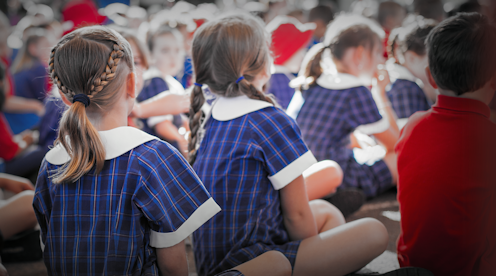What are we teaching our children when we use them as taxpayers of convenience?
- Written by Dale Boccabella, Associate Professor of Taxation Law, UNSW Sydney

The start of the Australian tax year is an opportunity to reflect on the way in which children - some of them very young - are being used to minimise their parents and grandparents’ tax, and the message that will send them.
Children are mainly used as taxpayers of convenience by controllers of discretionary trusts (often called “family trusts”), although there are other means as well.
The way in which it is done is to take advantage of childrens’ tax-free thresholds.
Each Australian resident gets a tax-free threshold of A$18,200[1] meaning the first $18,200 earned is untaxed. The Low Income Tax Offset[2] boosts this threshold further for low income earners ensuring some can earn up to $21,884 tax-free.
Unused tax-free thresholds are valuable for taxpayers who want to avoid tax. They can divert income to the holder of an unused threshold thereby turning what would otherwise be a high marginal tax rate into a marginal tax rate of zero.
Some taxpayers accumulate tax-free thresholds
Probably the most high-profile example of using the tax-free thresholds of others was a case over three decades ago in 1989 known as East Finchley Pty Ltd[3] versus the Commissioner of Taxation.
It made use of the tax-free thresholds of foreigners who at the time were allowed to receive $585 tax-free.
What happened was that the trustee allocated the trust’s taxable income to 126 non-residents in India who were relatives of the people behind the trust.
Each non-resident was allocated $585, which was the exact amount of his or her tax-free threshold.
The court heard a director of the trustee company travelled to India to request that each beneficiary loan back the income they had received.
Children are a source of tax-free thresholds
It works much the same way for children.
Young people over the age of 18 get the full tax-free threshold, meaning that if they have no other income, a trust can purport to hand them up to $21,884 on which zero tax will be paid.
While young people under the age of 18 get the same tax-free threshold for income from employment and some other sources[4], their tax-free threshold for distributions from trusts is limited to $416[5] per year in an attempt to curtail their use as taxpayers of convenience.
Yet Australia’s law reports are replete with examples of $416 per year being allocated to children under 18, some from when they are a few months old.
And there are exceptions that allow for children under 18 to receive up to $21,884 per year tax-free, including from a trust created by a grandparent’s will.
In many of these cases, the child never gets the money - it is used by the parents.
In many of these, the child doesn’t know they have been allocated the money.
The parents treat it as their own, with the “payment” to children being viewed as “just for tax purposes”.
When, and if, these children find out, it is likely to colour their views about the extent to which it is important to be truthful when complying with the tax law.
As it happens, it isn’t clear these parents are complying with the law.
Some of the arrangements artificial and contrived
Section 100A[6] of the Tax Act applies specifically to trusts.
It says where a beneficiary is allocated income but the benefit actually goes to someone else, the beneficiary is not taxed but a penalty rate of tax (45%) is imposed on the trustee.
There is an exception for an “ordinary family dealing”, but it does not extend to dealings that are “artificial, contrived, or overly complex[7]”.
Some parents are testing the “ordinary family dealing” exception. Among the claims being made by parents is that children need not get the benefit of money allocated to them because they need to reimburse their parents for the costs of their upbringing. Yes, you read that correctly[8].
Read more: Testamentary trusts are one of the last outrageous means of avoiding tax[9]
A strong case can be made that the Australian Tax Office hasn’t been tough enough in using Section 100A against taxpayer-of-convenience arrangements.
A strong case can also be made that if young adults aren’t able to meet their own expenses because they don’t earn their own income, they should be viewed as a dependant. And in turn, the $21,884 tax-free threshold should not be available to them.
And a case can even be made that treating children as taxpayers of convenience breaches their rights and child welfare laws. It certainly isn’t good for them if it encourages them to adopt the ethics of their parents.
The best approach would be to review and strengthen tax laws in order to remove the temptation for parents to even think about using their children in this way.
References
- ^ A$18,200 (www.ato.gov.au)
- ^ Low Income Tax Offset (www.superguide.com.au)
- ^ East Finchley Pty Ltd (jade.io)
- ^ employment and some other sources (www.ato.gov.au)
- ^ $416 (www.ato.gov.au)
- ^ 100A (www.ato.gov.au)
- ^ artificial, contrived, or overly complex (www.ato.gov.au)
- ^ you read that correctly (www.ato.gov.au)
- ^ Testamentary trusts are one of the last outrageous means of avoiding tax (theconversation.com)

















